What is the cause of the conflict in the GBAO and how is the situation developing in the region?
Read also
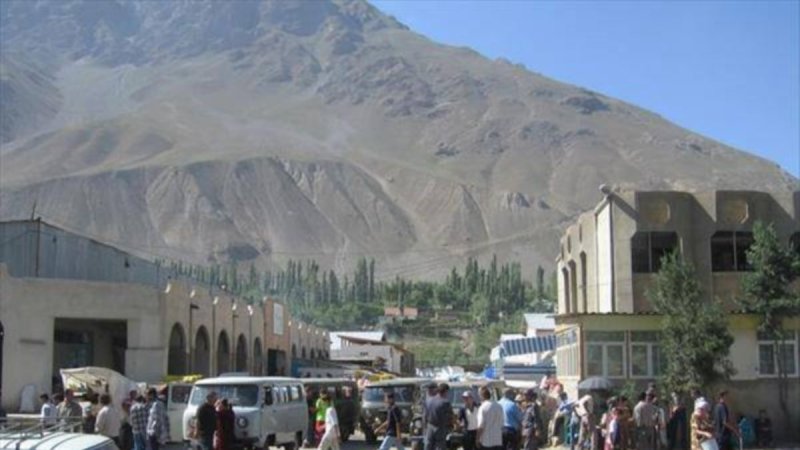
DUSHANBE, 10.02.2022 (NIAT Khovar) – Recently, a lot has been published on social networks regarding the situation in GBAO, which destabilizes the situation in society. In this regard, the Vice-Rector for International Relations of the Tajik National University, Doctor of Law, Professor Khairullo Mirzamonzoda expressed his views on why the situation in GBAO is stably tense.
The Tajik dictionary defines the word avlod as a community of blood relatives, i.e., children. Avlod as a society of blood relatives holds a special power and position in traditional Tajik. Avlod, as a social institution, has remained as such in GBAO, whereas in other regions such a strong dependence on this form of tribal-communal union of people is lacking.
In his work The Mountaineers of the Headwaters of the Pyanj River (Vakhanians and Ishkashimians), Count Alexey A. Bobrinsky writes that «among the mountaineers we noticed some instinctive awareness of the common ties of either kinship or culture that binds them all together.”
Here he is referring to the concept of avlod. He continues to characterize this concept.
«Closed life in separate valleys and gorges, often in winter in separate villages, closely ties the mountaineer to his native places, and develops in him a burning love for his mountains, for his native village, for his family.”
It is in the avlod that the personalities of its young members are formed, telling the younger generation that the avlod is everything, and its unity is inviolable. You die, but stand with the other members of the avlod if they need help. And it doesn’t matter if there are problems with the law, — you stand beside family first, and then sort out whether he was guilty or not.
«Without avlod, you are nobody in Pamir,» say GBAO residents.
«Nobody will come to your aid if you get hurt when sharing land or solving other social issues, or if you suddenly suffer at the hands of criminals, which are plentiful in Pamir, as well as in any other region.”
This is the first thing to know about the population of Pamir, — about their customs and traditions. This indirectly explains the gathering of people who come out to protest after any conflict of interest of one of their avlod with the authorities.
For a long time prior to the revolution the population of Pamir was under the oppression of the Afghan and the Bukhara emirs. These were difficult years of economic deprivation, spiritual humiliation, and incredible atrocities on the part of the oppressors.
«The reason was simple. The Afghans were adherents of Sunni Islam and did not consider the Pamirians faithful Muslims,» according to Lieutenant Colonel Grombchevsky of the Russian Army.
“Executions were carried out daily, villages were burned, girls and beautiful women were sent to the Afghan emir or given to Afghan soldiers as wives and concubines. In Shugnon they recruited 600 boys between the ages of seven to seventeen years old as hostages,” Grombchevsky adds.
A similar report was made in his notes about the actions of Bukhara nöker and the Secretary of the Russian Political Agency in Bukhara A. Cherkasov:
«Bukharians did not want to take into account the rights of mountaineers and very soon after their settlement in Shugnon, Rushon and Vakhon they began to forcefully take Pamirian girls, women and boys whom they liked.
Arousing the hatred of the population against themselves by their attitude towards their religion, the Bukhara officials at the same time incite Pamirians with disgust toward themselves with their tendency for debauchery and unnatural vices.”
All of this, along with the religious aspect, led to the fact that among the local population, who themselves call themselves «Pamiri» in social networks, it was considered absolutely impossible, and even a betrayal of their avlod and the entire Pamirian community, to have a girl marry an adherent of the Sunni denomination, and even more so coming from the lowland regions of Tajikistan.
In this regard, the words of Najiba Usmanova, the mother of Manija Sangin, in an interview with CABAR.asia are very remarkable:
«I talked a lot with Kyrgyz women and felt that they have a fear of men of their nationality. Then I learned that if a woman goes to work, for example, in Moscow and suddenly meets a man of another ethnicity there, she is subjected to violence in retaliation, — she may be raped.
It was shocking for me, and now I understand why there is stiffness and closedness of women from Kyrgyzstan, — the fear that any information can reach their fellow countrymen and they may be lynched. It’s scary.»
The situation is the same in Pamir. If a local girl responds to the advances of a non-Pamirian who is a guest from other regions of Tajikistan, the local «brothers» will beat up both the girl and the said guy.
So the situation with the so-called hostage-taking in Roshtkala was clear from the very beginning. The girl needed to change her passport to a different name and surname in order to travel to Russia again, and she turned to Habib Makhmadov, a policeman from her own village of Tavdem, for help.
He recommended that she seek help from the Deputy Prosecutor of the Roshtkala district Abdusalom Abirzoda. Judging by the video posted by the «proud Roshtkalinians» and the words of Yodgor Faizov, former GBAO chairman, there was no harassment or sexual harassment.
Yodgor Faizov is very respected person in the GBAO, and he cannot be accused of prejudice against his fellow Pamirians. Therefore, let us read what he says on this subject. Faizov states that Abirzoda called Shonazarova (the victim) and suggested that they “meet and resolve the issue of [her] passport. When this news reached the youth of the district, everyone knows what happened next.”
Ziyobekov and his comrades-in-arms forcibly dragged the Deputy Prosecutor of Roshtkala district from the local administration building and took him to the village of Tavdem, where they proceeded to beat and torture him for eight hours, finally making him apologize to the entire Pamir population in a video recording (which has become a fashionable phenomenon today).
Here is what Yodgor Faizov said about it, reproaching those who took the Abirzoda hostage:
«I told [Ziyobekov and his fellow villagers] that they acted vilely and made a mistake. It had a negative impact on the life and reputation of the GBAO. Imagine a young man from Badakhshan doing the same thing in another part of Tajikistan. To tell the truth, judging by the fact that a single phone call humiliates a person’s honor and dignity, it defies any logic.”
During the Soviet Union in Tajikistan there was a saying that “Leninobod rules, Kurgan plows, Karotegin trades, Kulob guards, Pamir dances.” This situation persisted until 1989, when Mamadayoz Navjuvanov was appointed to serve as the Minister of Internal Affairs by order of the Minister of Internal Affairs of the USSR. This radically changed the situation and caused discontent among the clans that ruled the union republic, and then Davlat Khudonazarov added fuel to the fire, who in the fall of 1991, with the support of the Democratic Party of Tajikistan, the Islamic Renaissance Party, the Rastokhez National Democratic Movement, and the Muslim clergy was nominated as a candidate for the first presidential elections in the history of Tajikistan.
Davlat Khudonazarov lost that presidential elections, but by that time the regional organization Lali Badakhshon had already been founded, which became republican and united many representatives of the Pamir population by the beginning of the civil war. In April 1992, deputies of the regional council announced the creation of the Autonomous Republic of Badakhshan in place of GBAO, and Lali Badakhshon entered the civil war on the side of the United Tajik Opposition (UTO). But while the so-called “vovchiks” were mainly active in Kurgan-Tyube and the outskirts of the capital, the Lali Badakhshon fighters were active in Dushanbe itself, leaving bad memories for the capital’s residents after their departure.
Further fighting led to the fact that all ethnic Pamirians mostly left for the GBAO, and from January 1993 the autonomous region was in a blockade. The only road from the center to Badakhshon was blocked by the UTO units, and from the so-called 9th kilometer to Rushon this entire territory was a zone of military operations. The UTO representatives also felt free in Khorog, Rushon and Shugnon, which were controlled by the so-called Pamir self-defense forces.
Practically until 1998, the region was in a sense cut off from the rest of the country, and it was no longer governed by «pirs», as had been the custom for centuries, but by the heads of armed groups formed according to the «avlod» principle. Even now, according to a representative of the NGO Farosatmo Gayurova, who spoke during one of the Ministry of Internal Affairs seminars on the interaction between the police and civil society, all the young people of Khorog are under the influence and protection of organized criminal groups. Faromuz Ergashev, a member of the Public Council under the Ministry of Internal Affairs of GBAO, expressed himself even more clearly, when he said that “working in the police for the youth of Khorog is a shame.”
After the collapse of the USSR and the start of the civil war in Tajikistan, drug smuggling in the GBAO became completely unhindered, and the presence of Russian troops on the Tajik-Afghan border did not change the situation. In conditions when transport links with the central part of the country were completely cut off, with the complete absence of industry and modern agriculture, drug smuggling became the only source of livelihood. A monument was erected in Khorog to the most important leader of the local drug mafia, Abdulamon Ayombekov, also known as Lesha-Gorbun. Both he and his father, as well as several of his brothers, were prosecuted under criminal articles back in the Tajik SSR. They say that in Khorog there was such a joke: “The Ayombekovs cannot meet in any way, either one is in prison, or the other.”
Khorog itself and all its nearby districts is divided between the clans-groups of Mamadbokir Mamadbokirov, Tolib Ayombekov, Munavvar Shambiev, Khursand Mazorov, Imomnazar Shoishirinov, Matlab Beknazarov, Niyozsho Gulobov, Rakhmonbek Makhmadov, Shakhbozbek Mukhamadaslam, and others whose main source of income is trafficking of drugs, weapons, precious stones, and metals.
After all of these leaders of the organized criminal group (OCG) «repented» in October 2018 of committing a variety of crimes ranging from creating a criminal association to calling and recruiting young people to organize riots and take over buildings and government offices, law enforcement authorities seized more than 2,000 firearms from members of criminal groups and the public, including even one portable air defense missile system and ten 82mm mortars. But despite the fact that all these «informal leaders» have signed warning protocols and committed to refraining from organizing criminal groups, illegal actions against state and public security, organizing «gatherings» and illegal rallies, urging youth to riot and seize state facilities, destroying state property, insulting government officials, interfering in civil and economic affairs, drug trafficking and arms trade, and blasphemy, they continue their criminal actions.
Since the events of 2018 alone, there have been 100 unlawful acts against law enforcement officers in the region, such as the use of violence, or the threat of such violence, obstructing lawful activities of police officers, infliction of bodily harm in the performance of their official duties. Two hundred drug-related crimes have been uncovered and more than 2.5 tons of drugs have been seized. Out of 90 members of transnational organized criminal groups from among the citizens of Afghanistan, Kyrgyzstan and Tajikistan who were detained for drug smuggling in the region, 82 were natives of the GBAO. Approximately 3,700 inhabitants of the region are registered as drug addicts, and 700 people have AIDS. Over the past five years, more than 500 people have died of overdoses in the region. According to available information, 15 local girls have been handed over to Afghan drug smugglers for debts to the drug mafia.
OCG members have also been involved in illegal trafficking of precious metals. Over the past three years, 14 crimes have been uncovered during which 5 kilograms of precious stones and metals were seized from illegal circulation, as well as 150 tons of gold-bearing rock. Mamadbokir Mamadbokirov’s brother is currently in prison for smuggling 37 kg of drugs, as are ten other members of his criminal clan. Two are wanted under Article 200 of the Criminal Code of the Republic of Tajikistan for illegal drug trafficking. Tolib Ayombekov’s son Abdurahmonov Mahmadali Tolibbekovich is in prison for drug trafficking, as are five other members of his criminal group. Five members of the OCG — Shanbiev, including his brother- Kurbonjon Navruzbekovich Shanbiev, are also in prison for smuggling and drug trafficking. A total of 56 members of the OCG, led by informal leaders of the region supported by the «independent media» are currently serving prison terms for drugs.
These three factors, as well as other circumstances, have led to the alienation and isolation of the population of the GBAO from the residents of other regions of the country. Among the local population in Badakhshon, especially among the young, statements like «we are not Tajiks, we are Pamirians» are often heard. Chorshanbe Chorshanbiev, who became famous because of his scandalous and unbefitting behavior, once said in response to the words of one of the Russian MMA fighters who called him a Tajik: “You will see a Tajik in the mirror, I am a Pamirian.”
According to Russian experts, between 1995-1998, about 150 tons of drugs were shipped through the GBAO annually.
“From 1992 until 1996, the lion’s share of the smuggled drugs entered the Fergana Valley through the almost «transparent» Afghan-Tajik border into the GBAO, and on to the CIS,» wrote Zelichenko, an Officer with the UN’s Osh Knot International Anti-Drug Project.
Clashes and conflicts between representatives of the central government, local leaders, and the criminalization of the region, with militants controlling virtually all spheres of life, have strained relations between the central government, which was trying to restore law and order in the GBAO, and with the local criminal authorities, referred to in the so-called independent media as «informal leaders» of the region. So, the illegal seizure and forcible detention of the Deputy Prosecutor, his beating and moral humiliation are just a continuation of the decades-long confrontation.
Local residents themselves say that if Ziyobekov was seeking justice, he should have gone to the district prosecutor and told him about everything and demanded the dismissal of the Deputy Prosecutor who turned a blind eye to the malfeasance of a local police officer, or at demanded jail time for this crime. But punishing a young man for offering to meet and discuss a girl’s problem is more like the behavior of «boys in the neighborhood.»
The regional prosecutor’s office opened a criminal case regarding the hostage-taking and incitement of hatred, and according to Fayzov, repeatedly summoned Ziyobekov and his accomplices for interrogation. Four of the young men involved in the capture of the Deputy Prosecutor were detained. An investigation was conducted, and they were convicted of the crime they had committed.
However, Ziyobekov could not be detained. When representatives of the Ministry of Internal Affairs came to Tavdem village, a huge crowd gathered there and to avoid disturbances and bloodshed, the representatives decided not to conduct a forceful operation. Internal Troops Commander Suhrob Raufzoda spoke with the residents and suggested that they bring Gulbiddin Ziyobekov to Khorog themselves.
Representatives of Ziyobekov’s avlod called the chairman of the region and asked to meet with him under the guarantee of security. The content of the conversation has already been written above, and Ziyobekov decided that the problem was settled.
The leadership of the GBAO Department of Internal Affairs invited Ziyobekov’s brother Intizor several times, suggesting that he persuade Gulbiddin to turn himself in. However, Ziyobekov, incited by Amriddin Alovatshoyev, another criminal leader of Roshtkala, and other members of his group, was protected in his village, — all access to which was controlled by members of his group and the avlod. At the time, the GBAO law enforcement agencies did not dare to launch a forceful operation to arrest Ziyobekov, as this could have led to bloodshed and possible casualties on the part of innocent citizens. It was only last November that the local State National Security Committee officers who went to arrest Ziyobekov managed to find a moment when there was not a large crowd in the village and tried to detain him.
According to one of the participants of the operation to detain Ziyobekov, he had a gun in his hands and even managed to shoot from it. In any case, the law allows a law enforcement officer to use weapons if the perpetrator is armed and resisting arrest. In such cases there is no command to open fire to kill, and each of the participants of the seizure group made the decision to open fire independently. The wounded Ziyobekov died while being taken to the hospital, and his avlod, who had already regained consciousness after the operation, brought the body of the murdered man to the building of the regional administration.
Using their connections, relatives of Ziyobekov and Alovatshoyev began to raise other clans — avlods, and mostly young people — representatives of the OCG and relatives from the clans of Ziyobekov and other criminal authorities of the region to join them and began to gather near the building of the regional administration. They demanded a fair investigation into the death of their compatriot, but at the same time they themselves began breaking the law by trying to break into the administration building, seizing weapons from police officers, and throwing stones at government representatives.
According to operational data, the criminal community in Khorog and nearby areas has up to 2,000 people who are constantly engaged in drug and weapon trafficking, hooliganism, beatings, and robbery of residents of other areas of the region and the country.
Thus, on December 27, Mamadbokir Mamadbokirov telephoned the Deputy of the Assembly of People’s Deputies of the GBAO Tolibsho Nasratshoev who had previously appeared on regional television to condemn the actions of young people near the GBAO administration and threatened him with violence if the Deputy allowed himself to make such statements again. On January 1 this year, near the building of the regional department of education, Mamadbokir Mamadbokirov threatened the head of the city of Khorog Atobek Shukurbekov, saying that his people would burn Shukurbekov’s personal car for supporting the authorities. On January 29, he also broke into the office on the fourth floor of the Department of Education, which was used by Lutfullo Navruzov, the head of the said provincial department, as his living quarters, insulted Navruzov and beat him and ordered him to leave Khorog.
According to Navruzov, Mamadbokirov had insulted him before, when he was just appointed to the post of head of the regional Department of Public Education, but at that time Navruzov did not file a complaint against him, believing that the incident was over. Then he gathered his OCG members in Barkhorug and commenting on the speech of Hakim Davlatzoda, deputy of GBAO Assembly of People’s Deputies from Darvoz district, said that now the authorities allegedly want to divide them along the territorial principle and started to stir up interethnic discord again, saying that they are humiliated not by Tajiks, but by Muguls and that «we will not give our honor and our autonomy to anyone.»
On February 3, Mamadbokir Mamadbokirov, being near the building of the regional Department of Education, stopped the official car of the Deputy Chairman of the city of Khorog, in which Gulomaidarova P. herself and Marodasenova M., chief editor of the newspaper Oinai Zindagi were present and began to prevent them from carrying out their official duties.
Mamadbokirov had allowed himself similar antics before. For example, on October 20, 2017, he broke into the regional court building and interrogated Judge Kosim Abdurasulov, while threatening him with firearms. He then walked out of the courthouse and stopped a car driven by Davlatmand Yusufzoda, chairman of the regional military court, and publicly insulted him and threatened him with violence. In May 2020, when Mamadbokirov stopped Farhodbek Darvoziev, chairman of the Vankala in Shugnon district, near the central market in Khorog, he threatened to kill him in front of many people. Criminal proceedings were instituted against Mamadbokir Mamadbokirov on all these facts, and he was officially summoned to the regional prosecutor’s office, but Mamadbokirov again ignored the summons and surrounded his home with members of his OCG and avlod, while asking members of other criminal clans and criminal gangs for support and assistance.
The region itself is currently supported largely through the national budget. Specifically, 66% of the budget consists of subventions from the republic’s government. The population of the autonomous region receives a large share of remittances from labor migrants, as well as support from the structures subordinated to the spiritual leader of the Ismailis of Badakhshon, Prince Karim Aga-khan IV. However, the lion’s share of the shadow budget comes from the illegal smuggling of weapons, drugs, and precious metals.
With the proper organization of the economy, the region could have a huge impact as a transit point for Chinese goods from the People’s Republic of China to the central regions of Tajikistan and further to Uzbekistan and Turkmenistan. However, due to rampant organized crime, it is still impossible to organize something akin to that in the GBAO.











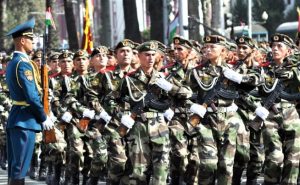 Tajikistan Celebrates the 33rd Anniversary of the Establishment of the Armed Forces with Grandeur
Tajikistan Celebrates the 33rd Anniversary of the Establishment of the Armed Forces with Grandeur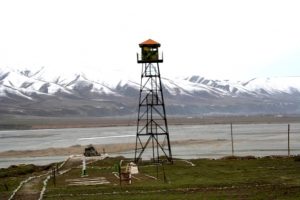 Statement by the Press Center of the Border Troops of the State Committee for National Security of the Republic of Tajikistan
Statement by the Press Center of the Border Troops of the State Committee for National Security of the Republic of Tajikistan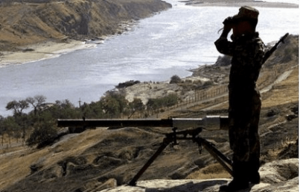 Statement by the Press Center of the Border Troops of the State Committee for National Security of the Republic of Tajikistan
Statement by the Press Center of the Border Troops of the State Committee for National Security of the Republic of Tajikistan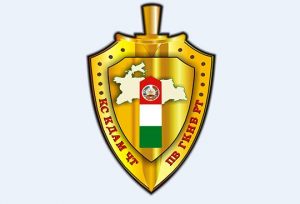 Statement by the Press Center of the Border Troops of the State Committee for National Security of the Republic of Tajikistan
Statement by the Press Center of the Border Troops of the State Committee for National Security of the Republic of Tajikistan Tajikistan and Uzbekistan agree to strengthen coordination in the fight against crime
Tajikistan and Uzbekistan agree to strengthen coordination in the fight against crime Gallup: Tajikistan Tops Global Safety, Stability, and Public Trust Rankings
Gallup: Tajikistan Tops Global Safety, Stability, and Public Trust Rankings Tajikistan Among the World’s Safest Countries
Tajikistan Among the World’s Safest Countries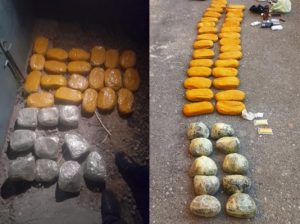 Attempt to Smuggle 70 Kilograms of Narcotics Foiled in Sughd Region
Attempt to Smuggle 70 Kilograms of Narcotics Foiled in Sughd Region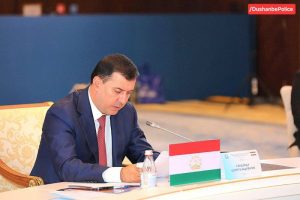 Public Order Maintenance in CIS Capitals Discussed
Public Order Maintenance in CIS Capitals Discussed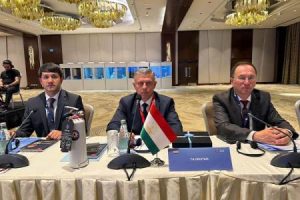 Tajikistan Strengthens International Cooperation in Civil Defense
Tajikistan Strengthens International Cooperation in Civil Defense














